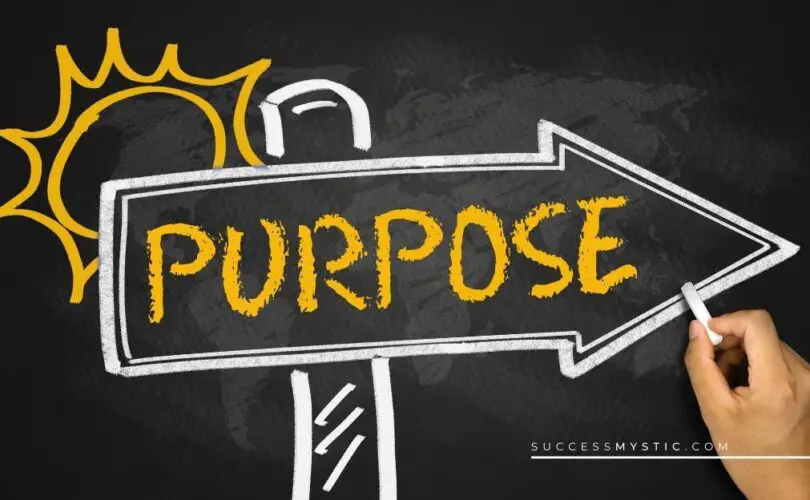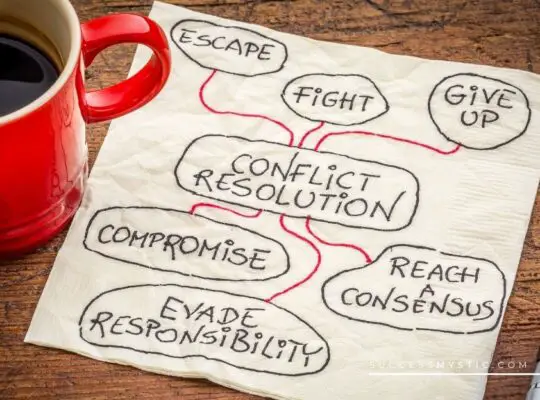The Feeling Of Aimlessness
Have you ever experienced a feeling of aimlessness? Have you ever felt lost? Confused? Or, as though you’re just wandering through life rudderless? It’s easy to do and we’ve all felt like that at one point or another.
Why?
Likely because you’re acting in ways that don’t align with your values. Values provide our lives with direction, meaning, and purpose. If you don’t know what your values are, then you will be directionless, and you will live a life without purpose.
So, how do you find direction? First, you have to identify your values to find your purpose.
Your values are simply your standards of behavior, beliefs, and attitudes about what is most important in life. It’s important to understand that values are subjective. Many of them will shift with time, while others such as honesty, loyalty, compassion, and integrity will likely stick with you.
If you want to identify your values accurately, then you can do so with a few leading questions.
- Imagine your funeral, how would you like your friends and family to say about you?
- Imagine your wedding, what type of person would you want your in-laws to think of you as?
- Imagine yourself as a leader, what qualities would you need to be successful?
You can ask others about their values, especially people you admire who are further on in their journey. When identifying your values, it’s important to act on them. Which is where principles come into play.
While values can be considered subjective, a principle is a fundamental truth. It is permanent and unchanging. For example, the natural law controlling the principle of gravity – if you drop an apple, the apple will fall to the ground.
Likewise, if someone tells you a lie, then you will not trust them. It’s natural. If your guiding principle is to neutralize negativity in your world, then there will be less negativity if you refuse to engage with negativity. The same is true of human behavior, if you want respect then you have to walk the talk. Daily meditation will improve your ability to respond to challenging situations rather than react.
The point being, if you are regularly implementing principles, then you will experience corresponding improvements.
Imagine, for a moment, that there’s a giant tree in your yard that you would like to remove. It’s gotten to the point where it’s overtaking everything and it’s a danger to your home. So, you grab an ax and chip away at it every day. You do it every day, consistently.
Each day, you will grow closer to your ultimate goal of removing the tree. Until, eventually, you will achieve the goal. Now, imagine the same situation, but every day you take a baseball bat instead of an ax.
You consistently batter the tree daily, but you get no closer to taking the tree down. You can be consistent and still fail if you select the wrong tool for the job.
A Guide To Life
What greater guide to life than a compass? Your values and principles calibrate your life compass. If you feel anxious, frustrated, or overwhelmed, your life compass has to come into play. Your life compass should be used every time you feel as though you are veering away from your values.
The purpose of this is to have a set of principles to guide your actions, even when the going gets tough. Values direct you to what you believe is important, while a principle is actionable and will lead to outcomes. As an example, take a look at the chart below to see a list of values, as well as principles.
| Values | Principles |
| Trust | Set big goals |
| Open-mindedness | Keep your eyes on the big picture |
| Loyalty | Create joy for others |
| Patience | Take action, relentlessly |
| Compassion | Prioritize |
| Gratitude | Execute |
| Accountability | Seek to understand |
| Resilience | Consistency over intensity |
| Assertiveness | Neutralize negativity |
| Honesty | Seek improvement constantly |
The world will let you know if you aren’t aligned with the values you hold. You may feel irritated, stressed, resentful, or lonely. It could be a range of emotions, but ultimately, it’s an indication that you have strayed off course. When you find this happening, you have to check your values and implement principles that will help guide you back to the main road.
As an example, two of Marshall’s biggest values are stillness and clarity. Yet, he finds himself stressed out and overwhelmed at work. This is in total opposition to those values. A quick scan of his values will provide him with a guide. From there, he can identify or develop a principle that will bring his actions and behavior into alignment with his values.
In the case of clarity and stillness, the most appropriate principles would be prioritization and execution. So, Marshall has to take a big step back, assess his situation, and choose the tasks that will have the greatest impact. Once he completes the most important task, he can move onto the next, and the next. Once he’s implemented the principle, he will find clarity and no longer feel overwhelmed.
There’s another issue to consider as we discuss direction and purpose – procrastination. Often, it surfaces as unease. It’s a clear conflict with a variety of values, from industry to resilience and even consistency and accountability.
When you notice yourself falling into the trap of procrastination you have to find a principle (like take action, relentlessly) to help you get back on track. No more avoiding, thinking about it or talking about it, it’s time to start doing! This is what will guide you back to your values.
Your values and principles often interact. For example, if boldness is one of your values you will likely get bored and restless if you aren’t taking enough risks. Therefore, you can put a series of principles into action to change things up.
Principles like set big goals and live it up will help. However, it’s also possible for some actions to conflict with your other values (like balance and patience). That’s where the ability to prioritize comes into play.
The Hidden Values
There is something else about the life compass that we should discuss. Its ability to help you uncover hidden values. If you are aligned with your values, but you still feel off or uneasy, then there’s a gap somewhere. Through a bit of reflection and teasing, you may just find out that you have some as yet undiscovered values.
Perhaps you are an impulsive person and over-eager in your communication with potential clients. Some people might think you’re a go-getter, but you could be pushing a potential client away through your impatience. You are chasing something, and you feel uneasy about it… you might just realize patience is one of your values. This is where a principle like look at the big picture comes in handy!
A life compass will provide you with a rudder by helping you stay aligned with your values. Most importantly, it will help you find purpose in your life by finding your direction.
That’s just for starters, now let’s talk about the principles and habits that will help you build a strong foundation to set off in the right direction.
Principles And Habits To Build A Strong Foundation
1| Find Your Passion, Live Your Passion
While some people are just lucky and know exactly what they want to do in life from a young age, the rest of us have a bit of work to do. Don’t worry, there’s good news no matter what your age – if you approach life correctly you can find happiness.
It all starts with finding things that you’re passionate about and going out of your way to do those things. When you find those things and walk that path, happiness is a natural byproduct.
2| Instinct Over Negativity
The key to uncovering your passion is to listen to your inner voice. You know that little voice that quietly whispers I’d like to try that, or I’m interested in that you often ignore. Or worse, that you put down.
We commonly dismiss the voice or make excuses like it’s too late or too hard or too silly or scary or you’re too old. None of those excuses are valid, it’s just a way for you to dismiss your inner wants because you’re worried about what other people might thing or of failing. Drown out the negativity and start listening to your instincts. Here’s how!
3| Values
We already discussed values, but now is your opportunity to write out a list of what you hold as values. What ideals do you believe in or live by? What values bring you a sense of peace or happiness within you?
4| Dream & Explore
Let yourself dream, write down all the things you enjoy. Make a vision board or a scrapbook that sums up everything that holds your attention or interests you. Explore the things you think might interest you and take a deep dive into the ones that keep your attention.
5| Experiment
Once you have a sense of the things that interest you, look for ways to connect with them more.
6| Take Baby Steps
By taking small steps in the right direction you actively build a strong foundation of experience. If you start taking big steps you can easily slip into the habit of saying things are too hard. Take it slow, big changes stem from small, serious steps.
7| Practice Positivity
Visualization and positive thinking are an important part of success. Direction and purpose are wonderful, but motivation and encouragement are also necessary. That’s where positivity comes into play. Visualize yourself finding direction and living your purpose and go get it.
8| Stick With It
The people who find success are the people who stick with it. No matter what happens, they refuse to give up. When things get hard, when everything seems hopeless, they keep pressing on. When it seems out of reach… you have to stick with it. Handily, positive thinking will help you with this.
9| Positive Support Network
A positive support network is important. If there are people who constantly tell you that it’s too risky or too hard or too impossible, then those are negative people dragging you down. You need people to praise and support you and people who can be honest kindly. You will know the difference between a truly supportive friend and the others. The latter are the ones you tell last because you don’t want to deal with their response.
10| Learning Opportunities
A challenge is simply a lesson in waiting. A problem is simply looking for a solution. The only true failure is when you give up.
11| Gratitude
The most successful people are consistently grateful for everything they have. Part of your daily practice should include writing in a gratitude journal or simply meditating on a handful of things you are grateful for.
Now, let’s get down to it. Let’s talk about finding your direction in life. To help you get started, I have four lessons for you.
Lessons For Finding Purpose
Lesson 1 – The End of Overthinking
A lot of the stress and anxiety that we feel about the future comes from the overthinking and analysis that we do. It’s something most adults are guilty of. We constantly question ourselves to the point of badgering and spent countless nights entertaining ideas and problems.
We spend so much time trying to figure out where we should go or where we should end up, that we’re often defeated before we have the chance to begin.
Over-analysis leads you nowhere, it wastes time and burns you out. The reality of the matter is that it doesn’t matter how smart you are, you simply cannot predict your future. The world moves so fast and everything is so interconnected it’s almost impossible to predict where you will be five years from now.
That isn’t a bad thing because you can still make plans, forecast, and tweak. The point, though, is that you make decisions based on what is important to you now and what aligns with your values.
It’s time to recognize and accept that life is unpredictable and there is no point in overanalyzing or overthinking. It’s time to live in the moment.
Lesson 2 – Do Something, Try Everything
Action is necessary. It does not just move you forward, it makes you feel better. You can spend your days thinking about a far-off dream or place, indulging in uncertainty and pipe dreams. Or you can determine your direction and take action to make it happen.
There is so much chaos in life and it is easy to be consumed by it. It’s important to recognize that you cannot control tomorrow, the only thing you have control over is the action you take right now.
That might sound scary to some people, but that’s the beauty of life. You have total control over your actions, thoughts, feelings, and words. If you are constantly trying to move forward in the right direction daily, then your decisions should reflect that.
Lesson 3 – Listen to Your Inner-Voice
Have you ever felt like you could make better decisions regarding your direction in life if you just knew more or had more information? Have you ever considered that you do have more information, you just aren’t hearing it because you refuse to listen to your inner voice? Instead, you chose to dig for more information.
You kept digging and digging and at some point, you looked up to realize you were surrounded by dirt, starting to cave in on you. It’s overwhelming, it’s confusing, and it leads to conflict. You get to a point where you don’t know who to believe or what to think.
At some point, though, you have to release the evidence and start listening to your gut. You have to take chances and you have to take small steps forward, even if you’re in the dark. You might stumble, you may even fall, but you can get back up again.
It might be repeatedly, but as long as you get up and go again, you’re going to win. It all begins with listening (and trusting) that inner voice that has been whispering to you.
Lesson 4 – Embrace Self-Belief
As you explore new opportunities to discover your direction, you may feel overwhelmed. A lot of people will be trying to do the same thing that you want to do. That’s okay. You might turn to your support network only to find that many aren’t encouraging and instead try to drag you back to square one with pragmatism.
As the seeds of self-doubt are sown within you, you lose momentum. You cannot let the naysayers get you down, you have to tune those out, tap into the positive voices, and embrace self-belief. Within you, you will find the positivity necessary to build the resiliency you need to find direction through purpose.
Don’t allow the ideas or opinions of others to suppress you. You have to continue down your path once you discover it. The more you focus on your inner voice and the positive voices in your life, the greater your self-belief will be.
Finding your purpose might feel like it’s the journey of your life, but ultimately, you should aim to go in one direction and one direction only – forward. Take small steps forward daily, ditch the overthinking, and learn to draw from deep within you.
Final Thoughts
It’s easy to feel stuck. It’s easy to avoid change due to fear. Sometimes, no matter how hard you try to avoid getting stuck, you do.
If you feel directionless, you have to re-examine your purpose. We have provided you with all the tools necessary to uncover your purpose, starting with determining your values and principles.
By knowing your values, setting your principles, and understanding your purpose, you will automatically find your direction is set. We mentioned how a life compass is calibrated by your values and principles. It will lead you in the right direction if it’s calibrated properly. That’s where purpose comes in.
When you have a purpose, every decision you make should align with that purpose. We already told you how your decisions should align with your values, therefore, it should be easy for you to gather that your values inform your purpose.
If you feel as though you are heading in the wrong direction, it’s because you no longer know what makes you happy. As you adventure through life, you should be taking notes on what makes you happy, what fills you with joy, enthusiasm, and energy.
What adds value to your life? It matters because as you realize what brings you joy; you can search for what common elements each activity shares. Identify your strengths to gain more awareness of what you excel in and what may hold a deeper meaning to you.
You have strengths unique to you, you also have core values unique to you. Your values have a large role to play in your life and the more you live in alignment with those values the happier you will be. Those values will inform your purpose which will direct the course of your life. You will make better decisions about the direction of your life if you are at one with your values and purpose.
As far as your values go, if you’re just getting started – work out your top ten and from there choose a top three to focus on. Just identifying them will leave you better equipped to make decisions.
It won’t just happen to you; direction won’t come to you. You create your direction by finding your purpose. It requires action. At some point, you have to stop thinking and take action. It’s time to let go of fear and go for what you want.
Guess what?
Nothing is set in stone; you’re not locked in! You are allowed to change your mind. As we mentioned, values change as you grow and evolve. Don’t be afraid to make changes to improve things in your life.







